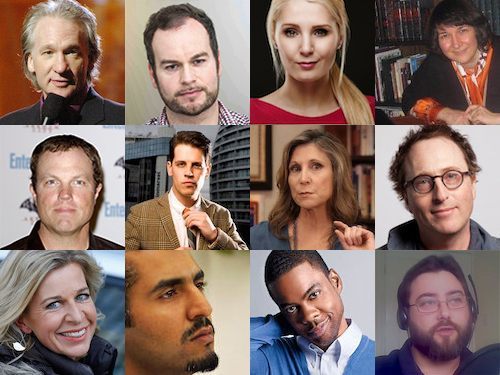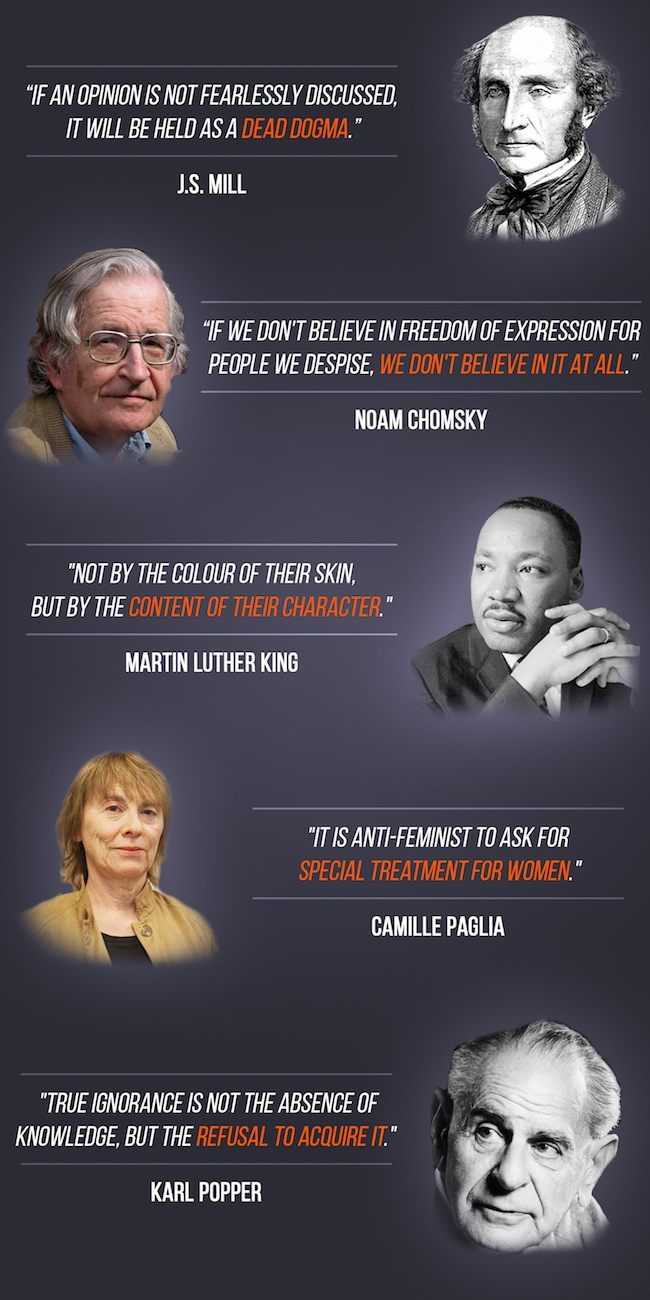A new force is emerging in the culture wars. Authoritarians of all stripes, from religious reactionaries to left-wing “social justice warriors,” are coming under fire from a new wave of thinkers, commentators, and new media stars who reject virtually all of their political values.
From the banning of Charlie Hebdo magazine across British university campuses on the grounds that it promoted islamophobia, to the removal of the video game Grand Theft Auto V from major retailers in Australia on the grounds that it promoted sexism, threats to cultural freedom proliferate.
But a growing number of commentators, media personalities and academics reject the arguments that underpin these assaults on free expression, in particular the idea that people are either too emotionally fragile to deal with “offence” or too corruptible to be exposed to dangerous ideas.
In a recent co-authored feature for Breitbart, I coined a term to describe this new trend: cultural libertarianism. The concept was critically discussed by Daniel Pryor at the Centre for a Stateless Society, who drew attention to the increasing viciousness of cultural politics in the internet age.
There is a reason for the sound and fury. Like all insurgent movements, the emergence of cultural libertarianism is creating tensions, border skirmishes, and even the occasional war with lazy incumbent elites. Some of these rows can be breathtakingly vitriolic, as self-righteous anger from social justice types collides with mocking and occasionally caustic humour from cultural libertarians.
WHAT THEY’RE FIGHTING
Cultural authoritarians from both the left and right occupy most positions of power in government, academia and the media. Both argue that art and expression can be harmful. Conservatives say that overly-violent video games and movies are the cause of school shootings and youth crime. This was the view of Jack Thompson, who led a crusade against violent video games and rap lyrics in the late 90s and early 2000s.
Progressives argue that “problematic” media can lead to racism and misogyny. In the words of left-wing culture critic Jonathan McIntosh, “oppressive media representations can be damaging sociologically.”
Underlying both Thompson’s and McIntosh’s arguments is the idea of culture as a corrupting influence, one that must be policed. This view has little scientific evidence to support it. A recent long-term study found no link between video games and sexism, and violent crime has been in decline for decades despite the growth of violent media. Nonetheless, arguments for a link continue to surface.
The new authoritarians aren’t merely concerned with policing art and entertainment, but also everyday expression, especially in advertising. Social psychologist Jonathan Haidt and free speech advocate Greg Lukianoff recently published an article for The Atlantic in which they describe a new movement to “scrub campuses clean of words, ideas, and subjects that might cause discomfort or give offence.” By controlling the language of society, cultural authoritarians hope to control society itself.
Cultural libertarians disagree. Liberal columnist Nick Cohen points out that changing words and changing society are two different things. “The lie that you can change the world by changing language is back,” he writes. “I cannot tell you how many good people [are driven] out of left-wing politics … because they did not realise that words that were acceptable yesterday are unacceptable today.”
In order to control what they see as dangerous expression, authoritarians often resort to casual and spurious accusations of misogyny, racism, and homophobia. The goal is to manipulate the boundaries of acceptable speech by smearing their targets with socially unacceptable labels and to write off speakers they don’t like as bigots so they don’t have to engage with the speaker’s arguments.
The range of socially acceptable speech and art is sometimes called the “Overton window.” The purpose of much contemporary criticism, according to cultural libertarians, aims to move or simply narrow that window.
Culture critics from the right and left claim that art can be harmful, but never provide adequate evidence of how this might be so. What cultural libertarians have worked out is that if you simply refuse to apologise, and reject outright any baseless claims of intolerance or bigotry, nothing bad happens.
Some of them, of course, go a step further and actively goad their critics. Spectacular social media meltdowns are now commonplace from social justice warriors who don’t get their own way.
They’ve also worked out that the people leading the charge in social media mobs have vastly disproportionate influence thanks to their publishing platforms and that not only are they hopelessly out of touch with popular opinion but that their tactics are unpleasant and hectoring, often veering into outright cruelty and persecution.
Other liberals in good standing are slowly backing away from extremists on their own side: Jonathan Chait, writing in New York magazine, admitted early this year that “the language police are perverting liberalism.” Columnist Freddie deBoer, while scolding Chait for being patronising, endorsed his core argument.
Cultural libertarians recognise that efforts to police language and expression are not only counter-productive, but also fragile. The people pushing for greater control are a small segment of the population, whose voice is amplified by media support. To fight them, all you have to do is ignore them – or, better yet, mock them.
Because the social justice tendency takes apparently fringe issues and elevates them to the status of historic civil rights battles, and because humour can be in short supply wherever you find authoritarian points of view, cultural libertarians have found needling their foes with waspish critiques and satire highly effective.
Cultural libertarians can frequently be found skewering critics who take themselves too seriously or are excessively earnest, especially when making specious arguments about the supposed “real-world effect” of violent or allegedly offensive media. Their attitude is refreshing for readers tired of being lectured to by newspaper columnists and east coast bloggers, and one of the reasons cultural libertarianism is gaining traction so quickly.
WHAT CULTURAL LIBERTARIANS BELIEVE
Free expression. No idea is too dangerous for cultural libertarians, who want total artistic and intellectual freedom. They often indulge in deliberately outrageous jokes and wacky opinions to test the boundaries of acceptability. Little wonder that the movement’s leaders often attract large followings from the the chaotic, politically incorrect world of anonymous imageboards like 4chan.
Resisting identity politics and public shaming. The movement can also be seen criticising modern methods of cultural control and the neo-puritanism they say has infected modern cultural criticism. The newest of these is a rash of social justice-inspired online vigilantism where professional offence-takers use the power of social media to destroy the reputations and careers of their targets. Justine Sacco, who faced global outrage and the loss of her job over a single politically-incorrect joke, is one well-known victim. Astrophysicist Dr. Matt Taylor and biochemist Sir Tim Hunt were also victims of this modern form of thuggery.
A sense of humour. Cultural libertarians combat anger with ridicule. There is a certain preposterousness to bloggers and social media addicts setting themselves up as a new priesthood, which makes them easy targets for comedy. As MIT Technology Review editor Jason Pontin puts it: “Tyrants, authoritarians and activists all hate the sound of laughter.” Cultural libertarians understand this instinctively.
An end to nannying and “safe space” culture. Arrayed against the cultural libertarians is the control freakery of the establishment, left and right, and the second coming of political correctness as embodied in campus safe space movements. This latter movement claims that students are too fragile to be exposed to dangerous ideas, and that even mildly offensive speech can cause permanent emotional damage. On the internet, these activists enjoy the support of outlets like Vox and Buzzfeed.
Defending personal freedom. Cultural libertarians may have their own opinions about how people should live their lives, or have low tolerance for offensive speech. But what distinguishes them from their opponents is their rejection of attempts to impose personal standards on others.
Defending spaces for uncomfortable opinions. Reason columnist Cathy Young is a critic of the “misogynistic rhetoric” of masculinist bloggers like Daryush Valizadeh, but nonetheless defended Valizadeh’s right to speak after activists launched a campaign to ban him from Canada. Cultural libertarians are serious about protecting the the freedoms of people they despise.
Fact over feelings. Hand in hand with their commitment to free speech goes a loathing for narrative-led journalism. Cultural libertarians are highly critical of “feelings over facts” in general, but particularly where it gives rise to failures in reporting such as the Duke Lacrosse case, the Rolling Stone debacle, “Mattress Girl” Emma Sulkowicz and GamerGate.
Standing up for consumers and producers over hand-wringing middle-class panic merchants. Cultural libertarians are the natural allies of consumers and want fandoms to have access to a wide variety of culture and ideas. They also stand up for the right of publishers and content creators to experiment wildly with art and believe that nothing should be “off-limits” however uncomfortable it may make some people.
Celebrating culture in all its forms. Cultural libertarians can be divided into three broad categories: vanguard hell-raisers who generate headlines by provoking social justice warriors, followed by a loose coalition of academics, journalists and social commentators who provide intellectual substance to the movement.
Finally, comedians, directors and movie stars who recognise the threat to creative freedom posed by cultural scolds bring up the rear, cautiously interjecting when authoritarian critiques overreach.
HOW TO SPOT A CULTURAL LIBERTARIAN
Identifying a cultural libertarian is easy. You’re likely to find them facing a wave of accusations of sexism, misogyny, rape apology, racism, homophobia, transphobia and islamophobia. Breitbart editor Milo Yiannopoulos and British TV personality Katie Hopkins, in particular, deliberately seek out battles in order to mock hand-wringers and appear to take pride in being labelled by their enemies.
But even moderates like feminist academic Christina Hoff Sommers and Cathy Young regularly face groundless accusations of “rape denialism” designed to shut down debate, to isolate them from other moderates and to have speaking invitations rescinded.
Cultural libertarians often have maverick or rebellious attitudes: the feminists among them tend to refer to themselves as “dissidents.” Mainstream publications can be reluctant to hire cultural libertarians, so they build their own audiences on platforms like YouTube, with its hands-off approach to independent commentators.
Carl Benjamin is perhaps the best example, but other video personalities such as Sh0eonHead, thunderf00t, and Alpha Omega Sin have attracted significant audiences with videos such as ShoeOnHead’s “oppression olympics” generating hundreds of thousands of views.
When cultural libertarians do seek an established platform, it is typically a libertarian or conservative one. They often complain that there doesn’t seem to a space for classical liberalism on the modern progressive left, nor on many technology platforms such as Twitter and reddit, which have arbitrary and censorious approaches to free speech. Reason, Spiked, The Rebel, and Breitbart have all made regular space for dissident commentators.
But don’t let that fool you. Cultural libertarians are united only by their opposition to authoritarianism and their robust views on free speech and free expression and cannot reliably be placed on the left-right spectrum.
Liberals like Bill Maher wouldn’t normally coexist on lists alongside Breitbart journalists, for example, but this new dimension in the culture wars has generated unexpected alliances. GamerGate, in particular, drew support from across political boundaries.
On the internet, there are several hubs of cultural libertarianism. Although one of the most heavily policed places on the internet, reddit still just about supports some well-trafficked communities that are essentially culturally libertarian: TumblrInAction, the forum that monitors the excesses of far-left activists on the blogging site Tumblr, is one example. So is gamer community KotakuInAction.
The uncontrollable, anonymous world of online imageboards also provides a natural home for cultural libertarians. It isn’t unusual to find a prominent cultural libertarian followed by thousands of Twitter accounts with anime avatars and pseudonymous account names.
Finally, cultural libertarians often preside over a young and diverse fan base which responds strongly to their irreverent attitude and propensity to stick two fingers up at the nannying media establishment. These young fans enjoy responding to controlling attitudes with mischief and ridicule.
That fan base can be highly eclectic, comprising gays and lesbians tired of the perpetually offended LGBT lobby, transgender individuals horrified by the finger-wagging habits of their own self-appointed representatives in the media, fans of populist political movements such as Occupy Wall Street, UKIP and the Tea Party, gamers, hackers, sci-fi fans, free speech activists, students, comedians, authors, classical liberals and of course traditional economic libertarians.
WHO THEY ARE
This list isn’t remotely comprehensive, of course, but here are a few figures in this blossoming movement of whom you should definitely be aware. Heavyweights from the past like Christopher Hitchens, Camille Paglia and Richard Dawkins inspired many of the people on this list, but we’ve selected either new faces who have risen to prominence in the last few years or veterans of the free speech movement whose recent comments or campaigns are worthy of note.
 Christina Hoff Sommers
Christina Hoff Sommers
Feminist academic
The American Enterprise Institute’s “factual feminist” has been fighting authoritarian ideologies for most of her career. Her 1994 book Who Stole Feminism? took aim at contemporary feminists for moving beyond their 1960s goals of equality of opportunity and political liberty. Then, in One Nation Under Therapy, she highlighted how society’s growing prioritisation of self-esteem and feelings was eroding self-reliance. Sommers’ personal ideology is called equity feminism, an increasingly popular branch of the movement that avoids victimhood narratives, emphasises freedom of choice, and does not seek to suppress the natural preferences of either sex.
Social media was once a control freak’s playground. Buzzfeed and Gawker regularly ginned up outrage mobs, turning Twitter into a kind of public stockade. Two events changed this. One was the GamerGate rebellion in 2014, which smashed the dominance of social justice warriors on social media. The other was Jon Ronson’s 2015 book, So You’ve Been Publicly Shamed, which challenged the argument that sociopathic, vindictive public shaming, so beloved of social justice warriors, was always the best way to achieve political goals.
 Bill Maher
Bill Maher
Comedian and talk show host
Bill Maher wouldn’t describe himself as a libertarian, but his strident opposition to the language police does make him a textbook cultural libertarian. Like Sommers, he was a leading figure in the fightback against the 1990s wave of political correctness: one of his early shows was named “Politically Incorrect”. He recently returned to the subject with a segment called “explaining jokes to idiots,” designed to poke fun at easily-offended viewers. An outspoken atheist, he has also been contemptuous of attempts to suppress criticism of Islam with the allegation of “Islamophobia.” He’s a liberal who has been famous for 20 years so hardly qualifies as an insurgent, but his recent statements have made him a guilty pleasure of free speech fanatics across the political spectrum.
Chris Rock told New York magazine in 2014 that he had stopped playing gigs on college campuses, saying political correctness was “back [and] stronger than ever.” He was ahead of the curve by about a year: Jerry Seinfeld, Amy Schumer, Dave Chappelle and Stephen Merchant have all since warned that comedy faces an existential threat from progressive culture warriors. Seinfeld got the bigger headlines, but it’s Rock whose commitment to free speech and unrestrained comedy earns him a spot on the list.
Knowing Breitbart’s Milo Yiannopoulos, I suspect he would balk at any association with libertarianism. Nonetheless, there are few who have done more damage to modern authoritarianism than him. His reporting on GamerGate was a vital part of its early momentum. Yiannopoulos has a habit of saying the unsayable and reporting on subjects no one else will touch, with a level of flamboyance that defuses the chilling aura of seriousness that authoritarians like to maintain around certain topics. Why? “The best response to outrage culture is to be outrageous,” he says.
Well-known figures in arts and entertainment have begun to speak out against the return of political correctness. Film director Eli Roth has made an entire movie mocking the social justice warriors of the internet. But conservative firebrand Adam Baldwin was there first. As early as 2009, he was publishing in-depth analyses of political correctness on this very website. Baldwin was credited with coining the term GamerGate, which described a year-long battle against outrage-mongers in video games. In revenge, activists tried to ban him from a conference in Australia. In a sign of the growing influence of cultural libertarians, Baldwin eventually won.
When a dominant ideology decides the time has come to Right a Great Wrong, the rights of individuals are often sidelined in pursuit of the cause. The best modern example of this is the feminist crusade against “rape culture” in America. Despite the fact that official figures show the crime is in steady decline, activists have steadily chipped away at the due process rights of suspects, with Vox editor Ezra Klein suggesting that even if innocent defendants suffer, the overall goal is more important. Checking their efforts is Reason contributor Cathy Young, who has been following feminist excesses for more than a decade. Her calm, detached interview of “mattress girl” target Paul Nungesser remains one of 2015’s journalistic highlights.
Last July, we broke the story of a Canadian libertarian party candidate who was fighting an internal battle with senior members of her own party. Southern’s public challenge to a feminist rally in Vancouver, in which she raised a sign proclaiming “there is no rape culture in the west,” had gone viral, and feminists within the party hoped to oust her. Southern’s eventual victory, in which she was restored to her candidacy and her rivals quit the party, sent an important message to the wider movement: libertarianism isn’t just about Bitcoin and weed anymore.
If there were a competition for the most culturally libertarian publication, the rebellious British journal Spiked would snatch the title comfortably. Under gadfly editor Brendan O’Neill, Spiked has waged war on everything from hate speech laws to the plain packaging of cigarettes. Spiked takes particular interest in campus censorship, recently establishing a ranking system to track student censoriousness on British universities. O’Neill himself is so hated by authoritarian campus activists that they’ve created a national “Ban Brendan O’Neill” day.
 Maajid Nawaz
Maajid Nawaz
British politician and anti-extremist
One of the most-watched clips of last year’s British Liberal Democrat party conference was a defence of free speech by the anti-extremist activist and Parliamentary candidate Maajid Nawaz. Left-wing activists responded to the Charlie Hebdo massacre by banning copies of the magazine on college campuses. Nawaz, a former Islamist, stood up for the magazine’s right to blaspheme. His critiques of the illiberalism of contemporary Islam made the progressive left so furious that he became the subject of a widely-criticised article in the Guardian, featuring anonymously-sourced pejorative remarks about Nawaz. This led to a stern public rebuke from the Guardian readers’ editor, who called the piece “insidious” and “wrong.”
Carl Benjamin, better known online as Sargon of Akkad, is one of the most popular anti-authoritarian commentators on YouTube, with close to 30 million views and over 160,000 subscribers on his channel. Benjamin’s This Week in Stupid series is essential viewing for cultural libertarians, regularly breaking the 100,000-viewer mark. Benjamin is a left-wing European, but enjoyed a lively discussion with conservative actor Adam Baldwin, in which they disagreed on almost everything – except, of course, cultural freedom.
British columnist and TV personality Katie Hopkins has built a reputation as the country’s leading provocateur. Her comments about fat people, suicidal prisoners, and gingers are designed to enrage. Deliberate offensiveness plays an important role in the fight against cultural authoritarianism, however, showing that with a little cleverness, it’s possible to express controversial opinions and not just survive but become a cult hero.
FREE SPEECH ON THE RISE
The backlash against political correctness in the 1990s achieved results: facing pressure from intellectual behemoths like Paglia, Hitchens and Dawkins, the PC fad died off. But it did not produce organisational structures and networks that would stop the problem from arising again. Free speech is always and everywhere under threat. As Sommers is fond of saying: “We won the arguments, but they quietly assumed the assistant professorships.”
This time, things could be different. The conservative commentariat, aware that the movement has lost on gay marriage and is in deadlock on abortion, is eager to open up more winnable fronts. Weekly Standard editor Bill Kristol recently made a cautious attempt to understand the GamerGate controversy, while David Frum attracted considerable attention for his comments on the crisis at Reddit. The ASI think tank in London has also displayed interest in the new culture wars.

[ Levels of interest in selected cultural libertarians. Blue–Lauren Southern; Purple–Milo Yiannopoulos; Red–Christina Hoff Sommers; Yellow–Cathy Young; Green–Spiked Online. (Source: Google Trends) ]
They are right to sense an opportunity. Social surveys show that millennials are the least racist, least sexist, least homophobic generation in the history of the species. Yet in the absence of overt racism, progressive culture warriors invented “microaggression theory”, frightening millennials with allegations that they are still racist, sexist, and homophobic, just on a subconscious level. It was only a matter of time before the anxiety culture warriors created was replaced by irritation.
Classical liberalism has typically survived because journalists have cared about it. But it hasn’t attracted the support of well-funded major institutions, because most people want to control something. But, faced with the rise of a new totalitarianism, figures from across the political spectrum are beginning to converge on a new libertarian consensus. Once they are properly organised, it will mean dark days for control freaks on the left and the right – and clear blue skies for lovers of cultural freedom.
Follow Allum Bokhari (@LibertarianBlue) on Twitter











COMMENTS
Please let us know if you're having issues with commenting.